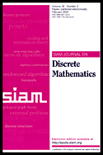
SIAM JOURNAL ON DISCRETE MATHEMATICS
Scope & Guideline
Connecting theory with impactful applications.
Introduction
Aims and Scopes
- Graph Theory and Combinatorics:
The journal publishes research on the properties, structures, and applications of graphs, including topics such as colorings, matchings, and connectivity. - Algorithm Design and Analysis:
Papers often focus on developing efficient algorithms for combinatorial problems, emphasizing computational complexity and optimization techniques. - Matroid Theory:
Research on matroids, their properties, and applications in optimization and combinatorial structures is a significant focus area. - Random Structures and Probabilistic Methods:
The journal encourages studies that explore random graphs, probabilistic combinatorics, and the implications of randomness in discrete mathematics. - Discrete Geometry and Topology:
Contributions that investigate geometric aspects of discrete structures, including packing and covering problems, are commonly featured. - Applications of Discrete Mathematics:
The journal includes works that apply discrete mathematical concepts to real-world problems, particularly in computer science, operations research, and engineering.
Trending and Emerging
- Randomized Algorithms and Stochastic Processes:
There is a growing trend towards the exploration of randomized algorithms and their applications in various combinatorial settings, reflecting the importance of randomness in algorithm design. - Combinatorial Game Theory:
Research in combinatorial game theory is on the rise, with applications in economics, computer science, and decision-making processes, indicating an expanding interest in strategic interactions. - Network Theory and Complex Systems:
The study of networks, including social, biological, and technological networks, is increasingly prominent, emphasizing the interconnectedness of discrete structures in real-world applications. - Higher-Dimensional Combinatorics:
Emerging research focuses on combinatorial structures in higher dimensions, exploring new mathematical challenges and applications in areas like geometry and topology. - Matroid Applications in Optimization:
There is a notable increase in research applying matroid theory to optimization problems, particularly in algorithm design and network flows, highlighting the utility of matroids in contemporary mathematics.
Declining or Waning
- Classical Graph Algorithms:
While foundational algorithms remain important, there has been a noticeable decline in papers focused solely on classical graph algorithms without novel contributions or applications. - Elementary Combinatorial Techniques:
Basic combinatorial techniques and methods are being overshadowed by more sophisticated approaches, leading to fewer publications solely centered on elementary methods. - Fixed-Parameter Tractability in Isolation:
Research that focuses solely on fixed-parameter tractability without connections to broader algorithmic or combinatorial contexts is becoming less common. - Traditional Optimization Problems:
Standard optimization problems that do not incorporate new insights or interdisciplinary applications are facing reduced attention in favor of more complex or novel problems. - Static Combinatorial Structures:
Research on static structures, such as those that do not involve dynamic or randomized elements, appears to be waning as the field moves towards more dynamic and probabilistic models.
Similar Journals

Australasian Journal of Combinatorics
Bridging Ideas in the Realm of Discrete MathematicsThe Australasian Journal of Combinatorics, published by the CENTRE DISCRETE MATHEMATICS & COMPUTING, serves as a vital platform for researchers and professionals engaged in the dynamic field of discrete mathematics and combinatorics. With an ISSN of 2202-3518 and an E-ISSN of the same, this journal has been committed to open access since 2014, ensuring that groundbreaking research is readily available to a global audience. Based in Australia, specifically at the Department of Mathematics, University of Queensland, this journal spans the years from 1996 to 2024, showcasing the evolution of combinatorial research over nearly three decades. Recognized in the 2023 category quartiles as Q3 in Discrete Mathematics and Combinatorics, it ranks 68th out of 92 in Scopus, reflecting its growing influence despite its current percentile of 26th. The Australasian Journal of Combinatorics is dedicated to fostering innovative research and theoretical development, making it a valuable resource for academics and students alike.

Contributions to Discrete Mathematics
Unveiling new dimensions in combinatorial studies.Contributions to Discrete Mathematics, published by the Department of Mathematics and Statistics at the University of Calgary, serves as a vital platform for disseminating innovative research within the dynamic field of discrete mathematics and combinatorics. Established in 2008, this journal has rapidly gained recognition, currently holding a Q3 classification in discrete mathematics and combinatorics for 2023. As it aims to foster academic dialogue and share groundbreaking discoveries, the journal showcases high-quality peer-reviewed articles that cover a range of topics, from theoretical explorations to practical applications. Although it currently operates under a traditional subscription model, there is a growing commitment to enhancing access options, ensuring that critical knowledge is available to researchers and practitioners alike. With its notable Scopus ranking of #50 out of 92 within its category, this journal is positioned as an important resource for students, academics, and industry professionals who seek to stay at the forefront of discrete mathematics research.
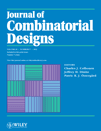
JOURNAL OF COMBINATORIAL DESIGNS
Connecting Researchers through Combinatorial InnovationJOURNAL OF COMBINATORIAL DESIGNS, published by Wiley, is a leading peer-reviewed journal that serves as a vital platform for researchers in the field of discrete mathematics and combinatorics. With an impressive Q1 ranking in the 2023 category, it stands at the forefront of academic discourse, showcasing significant developments and innovative research from 1993 to 2024. The journal is dedicated to the study of combinatorial designs, including their applications in various scientific disciplines, which enhances its relevance among mathematicians and applied scientists alike. Although it operates on a traditional subscription model, the journal continues to attract high-quality submissions, as evidenced by its Scopus rank of #40 out of 92 in Discrete Mathematics and Combinatorics, placing it in the 57th percentile. Its commitment to advancing knowledge in combinatorial theory and applications makes it an essential resource for professionals, researchers, and students seeking to deepen their understanding and contribute to this dynamic field.

Annals of Combinatorics
Pioneering Insights in Combinatorial ResearchAnnals of Combinatorics, published by Springer Basel AG, serves as a premier platform for innovation and research in the field of discrete mathematics and combinatorics. With an ISSN of 0218-0006 and an E-ISSN of 0219-3094, the journal captures the ongoing developments and breakthroughs that characterize this dynamic discipline, which plays a crucial role in various applications such as computer science, optimization, and statistical mechanics. The journal has been recognized as part of the Q2 category in the 2023 rankings for discrete mathematics and combinatorics, reflecting its significant contribution to the academic community. Researchers and educators alike benefit from its insightful articles that not only cover theoretical advancements but also practical implications. With convergence years spanning from 2005 to 2024, the Annals of Combinatorics continues to be an essential resource for anyone looking to deepen their understanding and explore new frontiers in combinatorial research.
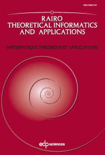
RAIRO-THEORETICAL INFORMATICS AND APPLICATIONS
Exploring the Frontiers of Theoretical Informatics.RAIRO - Theoretical Informatics and Applications is a renowned academic journal published by EDP Sciences S A that has been at the forefront of disseminating innovative research and applications in the fields of computer science and mathematics since its inception in 1995. With a focus on theoretical and applied aspects of informatics, the journal serves as a vital resource for researchers and professionals seeking to explore the intricacies of computational theories and their practical applications. Although currently lacking an Open Access model, it provides invaluable insights from distinguished researchers within its Q4 category rankings across its pertinent fields. As reflected in its Scopus rankings, including a position in the 24th percentile for General Mathematics and the 9th percentile for Computer Science Applications, RAIRO is pivotal in contributing to the ongoing discourse and advancements in theoretical informatics. Researchers, professionals, and students will find this journal critical in understanding emerging trends and challenges in the rapidly evolving domains of computer science and mathematics.
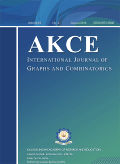
AKCE International Journal of Graphs and Combinatorics
Fostering Global Collaboration in Discrete Mathematics.AKCE International Journal of Graphs and Combinatorics, published by TAYLOR & FRANCIS LTD, serves as a significant platform in the field of Discrete Mathematics and Combinatorics. With its commitment to open access since 2015, the journal ensures that cutting-edge research is readily available to a global audience, promoting the dissemination of knowledge and high-quality scholarship. Recognized for its impact in the discipline, the journal is currently ranked Q3 in its category for 2023 and holds a commendable Scopus ranking, falling within the 69th percentile. Researchers, professionals, and students alike will find invaluable insights and contributions in this journal, which spans a wide range of topics related to graph theory and combinatorial structures. Operating from its base in India, and converging from 2011 to 2024, the AKCE International Journal invites submissions that push the boundaries of mathematical exploration and foster innovative methodologies in a rapidly evolving field.
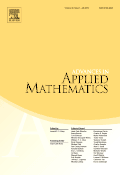
ADVANCES IN APPLIED MATHEMATICS
Advancing Knowledge, Transforming ApplicationsADVANCES IN APPLIED MATHEMATICS, published by ACADEMIC PRESS INC ELSEVIER SCIENCE, is a prestigious journal that has served the mathematical community since 1980. With its ISSN 0196-8858 and E-ISSN 1090-2074, the journal is based in the United States, specifically in San Diego, CA. As a leading periodical in the field, it holds a notable Q2 ranking in Applied Mathematics and has been consistently ranked in the 43rd percentile among similar journals, illustrating its relevance and impact within the discipline. Although not an Open Access journal, ADVANCES IN APPLIED MATHEMATICS plays a crucial role in disseminating significant research findings, theoretical studies, and innovative applications of mathematics that address real-world problems. Researchers, professionals, and students alike will find valuable insights in its carefully curated publications, making it an essential resource for those looking to advance their understanding and application of mathematics.
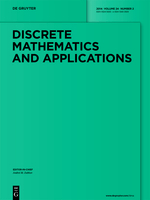
Discrete Mathematics and Applications
Unlocking the Potential of Discrete Mathematics for Real-World Impact.Discrete Mathematics and Applications, published by WALTER DE GRUYTER GMBH, is a vital academic journal catering to the expansive fields of Discrete Mathematics and Applied Mathematics. With an ISSN of 0924-9265 and an E-ISSN of 1569-3929, it serves as a reputable platform for disseminating innovative research and developments within these domains. The journal has been contributing to the academic landscape since its inception in 1991 and continues to actively publish impactful studies through 2024. Despite its current positioning in Q4 of both the Applied Mathematics and Discrete Mathematics and Combinatorics categories, the journal is dedicated to fostering essential discussions that advance understanding and application of discrete mathematical concepts. It provides researchers, professionals, and students with access to a wealth of knowledge, encouraging collaboration and growth within the field. With its strategic German headquarters in Berlin and a focused aim to enhance the visibility and significance of discrete mathematics in real-world applications, Discrete Mathematics and Applications stands out as an important resource for those seeking to contribute to the ongoing evolution of mathematical sciences.

DISCRETE MATHEMATICS
Unraveling the complexities of mathematical structures.DISCRETE MATHEMATICS, published by Elsevier, is a leading journal dedicated to the field of discrete mathematics and combinatorics, with a distinguished presence in the academic community since its inception in 1971. With an ISSN of 0012-365X and an E-ISSN of 1872-681X, this esteemed journal has firmly established itself within the Q1 category for Discrete Mathematics and Combinatorics, and Q2 for Theoretical Computer Science as per the 2023 metrics, underscoring its pivotal role in advancing research in these vital areas. DISCRETE MATHEMATICS is highly regarded, reflected in its Scopus rankings, where it stands at #44 out of 92 in its primary category, contributing significantly to the global discourse on complex mathematical theories and applications. Published from the Netherlands, the journal serves as a crucial resource for researchers, professionals, and students looking to stay informed about the latest innovations and methodologies in discrete mathematics. Though currently not an open-access journal, DISCRETE MATHEMATICS continues to foster a vibrant scholarly community through rigorous peer-reviewed research, promoting a deeper understanding of the mathematical structures that underpin both theoretical and applied science.

DISCRETE & COMPUTATIONAL GEOMETRY
Navigating the World of Geometry and Discrete SystemsDISCRETE & COMPUTATIONAL GEOMETRY is a prestigious journal published by Springer, specializing in the fields of computational geometry, discrete mathematics, and theoretical computer science. With its ISSN 0179-5376 and E-ISSN 1432-0444, this journal has established itself as a key resource for researchers and professionals, offering a platform for the dissemination of high-quality research from 1986 to 2024. Recognized for its impact in the academic community, it currently holds a Q2 ranking in several important categories, including Computational Theory and Mathematics, Discrete Mathematics and Combinatorics, Geometry and Topology, and Theoretical Computer Science. Although it is not an open-access journal, the rigorous peer-review process ensures that published articles meet the highest standards of scientific integrity and scholarship. With Scopus rankings reflecting its influence—placing it in the 72nd percentile for Geometry and Topology and 62nd for Discrete Mathematics—it serves as an essential reference for students and scholars seeking to deepen their understanding of complex geometric and combinatorial theories.